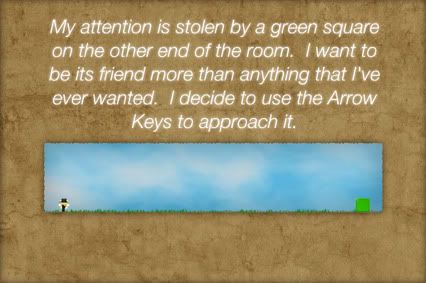
Jack is a very lonely man and he couldn’t tell you for sure why this is. There used to be somebody that he held very dear, but that person is long gone. All he has are his own fragmented memories of the past and a lone, silent visitor which he relays his story to. Jack is certain he can make it all by himself.
The Company of Myself is a puzzle-platformer made by 2DArray, or as his mother presumably calls him; Eli Piilonen. It is a game about loneliness and concerns the choices Jack has made that has brought him to this state of isolation from human contact. This is done both through his somewhat cryptic narration but, above all, through the level design. At first glance many levels will appear impossible to traverse without the help of a second character, but Jack will be quick to tell you that if you press Space the level will restart and this time there will be a second Jack, a ghost which will mimic the actions he performed before you restarted the level. You have to figure out how to make these multiple versions of Jacks work together in order to maneuver through the levels, which will become devilishly difficult very quickly.

It's just Jack and his hand tonight, it seems.
This is a puzzle mechanic that you will likely have seen before, most notably in Braid and the underrated Chronotron, but what sets TCoM apart from many of its contemporaries is how brilliantly the game manages to balance the story and the gameplay without making either seem superfluous. Braid was often praised for this, but it was only really in the last level where the story and the game fused to extraordinary effect. The rest of the game might as well not have had a story at all and it pretty much didn’t. TCoM manages to make the levels themselves seem like interactive metaphors for Jack’s memories and the choices and mistakes he has made. This is best portrayed at the point in the game we get to actually see Jack’s lost lover Kathryn and for a few levels you are no longer alone. You control both characters through a flashback and it somehow manages to make a series of puzzle levels feel like a love story.
Then you are presented with a level that you realise from the beginning that you do not want to beat, because in order to beat it you have to make a choice you do not want to make. The game throws you a curveball here and you realise that maybe you are not in fact merely a silent companion listening to Jack’s ramblings, but that you are Jack and you make the same mistakes that Jack makes. In fact, you are the one that makes Jack do them; it is your damn fault. Being a gamer I obey my instincts and I finish the level, make the inevitable mistake and I doom Jack, because my gaming instinct is to keep playing and keep beating puzzles. TCoM does something beautifully here; it forces me to redefine what I consider “winning” in a game, while at the same time asking bigger questions about determinism and the consequences of the choices one makes, not to mention the power of memories and how well they can be trusted. All this is done in a modest puzzle game which probably won’t take you more than an hour to finish.

Like the song says: "love doesn't last"
It is a shame that the epilogue is really disappointing and in a way it rids the game of some of its magic. It ties up the story and explains “what it all meant” when that clearly wasn’t necessary. Since the rest of the game told so much with such simple means, just having a scrolling text at the end tell us exactly what really happened and rid the story of its beautiful ambiguity feels a bit like cheating. Some endings and meanings are best left stewing in the player’s imagination instead of being spelled out black on white.
But TCoM isn’t all about story and fuel for pseudo-intellectual discussions like this; it is also a very competent and satisfying puzzle game. The levels require a lot of lateral thinking and impeccable timing, so even if you only want a brief platform adventure to play on a lunch break, this should still be very much down your alley. It’s an excellent example of a near-perfect fusion between great game design and involving storytelling and that’s hardly something you stumble upon everyday, now is it?

















Lovely review, dude. You really seem to “get it,” as far as this game goes. …I’m not trying to sound pompous and imply that Average Joe wouldn’t get it, but you’ve deconstructed the game especially accurately. And I mostly agree with you about the ending, to be honest.
Keep an eye out for Grief, if you’re looking for more. It’s a semi-sequel where you play as Henry, the “silent visitor” from Company. It’s not out yet, but you can read about its dev progress and see a demo version of what works so far at my site: 2DArray.net
Just had a go on this. I see what you’re saying about the game, shame my fingers wern’t made for keyboards. I just don’t have the ability to finish this nice little story.
Okay, went back to it and finished it. Seems I was only one level away from the end anyways, if I’d known that, I’d have just kept going with it!
That was a good find, and really fits the description of “Hidden Gem”, well done Eli!!!